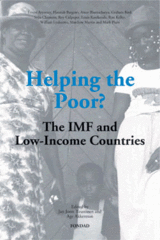Helping the Poor? The IMF and Low- Income Countries
|
Contributing authors:
Ernest Aryeetey,
Hannah Bargawi,
Graham Bird,
Stijn Claessens,
Roy Culpeper,
Louis Kasekende,
Ron Keller,
William Lyakurwa,
Matthew Martin,
Jan Joost Teunissen
Editors: Jan Joost Teunissen and Age Akkerman Summary
A book that discusses the successes, failures and shortcomings of how the IMF and World Bank have assisted poor countries, analysing in detail the policies pursued.
Contributing authors include experienced observers of IMF and World Bank practices as well as policymakers and thinkers from these and other institutions. Development assistance shifted in the 1980s from financing investment to promoting policy reform, since it was believed that low-income countries were held back more by weak policies than by lack of finance for investment. However, the reforms of the 1980s and 1990s advocated by the IMF and World Bank did not bring the expected results. Poverty remained high and the economic reforms lacked sufficient political support. At the end of 1999, the IMF and World Bank developed a new framework for their support to low-income countries in Africa and elsewhere: the Poverty Reduction Strategy approach. This new approach was meant to focus more clearly on economic growth and poverty reduction. Helping the Poor? The IMF and Low-Income Countries discusses the successes, failures and shortcomings of IMF and World Bank support to poor countries. Analysing in detail the policies pursued by, especially, the IMF the book reveals that the assistance has remained insufficient, often mal-directed and still too much inspired by beliefs held in Washington. The book provides a wealth of critical reflections and practical suggestions of how poverty and development can be dealt with more effectively. Quotes
“Above all, the IMF needs to adapt its conditionality to the needs of low-income countries and their wishes for genuinely country-led strategies”. Matthew Martin and Hannah Bargawi, Debt Relief International
“The IMF should be more flexible in programme design and react as problems reveal themselves, as opposed to setting unrealistic monetary and inflation targets”. Louis Kasekende, Bank of Uganda “The recurrent nature of the debt problems, the ongoing debates, and the limited and poor resource transfers are but signs of the need for deeper reforms to the institutional framework for dealing with the financing problems of low-income countries”. Stijn Claessens, University of Amsterdam/World Bank “The Bank’s and the IMF’s future role involves … greater empowerment of the borrowing governments and … a move from stabilisation to more pro-poor macroeconomic frameworks”. William Lyakurwa, African Economic Research Consortium “Emphasis should be placed on adjustment with growth. However, given the lack of scientific consensus about the causes of growth, member countries need to be encouraged to formulate their own development strategies that the IMF can then endorse, monitor and support”. Graham Bird, Surrey Centre for International Economic Studies Contents
Contents, Abbreviations & Notes on Contributors
1 An Inquiry into the Nature and Causes of Poverty: By Way of Introduction
2 The IMF and Poor Countries: Towards a More Fulfilling Relationship
3 Enhancing the Credibility of the IMF
4 A Changing Role for the IMF in Low-Income Countries
5 No Agreement Yet on the Fund’s Role: By Way of Comment on Graham Bird and Matthew Martin
6 The Dynamics of Donors, Recipient Countries and the IMF
7 Institutional Changes to Prevent the Recurrence of Debt Problems
8 Sub-Saharan African Countries’ Development Strategies: The Role of the Bretton Woods Institutions
9 Stepping Up Ambitions of the Poverty Reduction Strategy
10 New Finance for African Development 11 Millennium Development Goals: Are They Adequate? Roy Culpeper |
 € 17,50
Order now
June 2005 |










 Download Book as PDF
Download Book as PDF